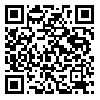Volume 18, Issue 3 (September 2020)
Iranian Rehabilitation Journal 2020, 18(3): 345-354 |
Back to browse issues page
Download citation:
BibTeX | RIS | EndNote | Medlars | ProCite | Reference Manager | RefWorks
Send citation to:



BibTeX | RIS | EndNote | Medlars | ProCite | Reference Manager | RefWorks
Send citation to:
Maleki ShahMahmood T, Ghayoumi-Anaraki Z, Ebadi A, Haresabadi F. Diagnostic Accuracy of the Photographic Expressive Persian Grammar Test to Identify 4-6 Years Old Children With Developmental Language Disorder. Iranian Rehabilitation Journal 2020; 18 (3) :345-354
URL: http://irj.uswr.ac.ir/article-1-1140-en.html
URL: http://irj.uswr.ac.ir/article-1-1140-en.html
1- Department of Speech Therapy, School of Paramedical Sciences, Mashhad University of Medical Sciences, Mashhad, Iran.
2- Behavioral Sciences Research Center, Life Style Institute, Baqiyatallah University of Medical Sciences, Tehran, Iran.
2- Behavioral Sciences Research Center, Life Style Institute, Baqiyatallah University of Medical Sciences, Tehran, Iran.
Abstract: (4377 Views)
Objectives: Accurate diagnosis of Persian children with Developmental Language Disorder (DLD) is regarded as a challenge for Speech and Language Pathologists (SLPs) in Iran because of the lack of formal linguistic tests that can reliably distinguish language-impaired children from Typically-Developing (TD) children. This study aimed to investigate the diagnostic accuracy of the photographic expressive Persian Grammar Test (PEGT).
Methods: The participants were forty 4-6 years old monolingual Persian speakers who were categorized into two groups of DLD (n=20) and TD (n=20) children based on the MLU (mean length of utterance) scores as the reference standard and clinical judgment of an experienced speech-language pathologist. PEGT was administered to all participants, and the results were analyzed using the Mann-Whitney test and Rock Chart (ROC) to estimate the ability of the PEGT to differentiate between children with DLD and TD and to determine its sensitivity, specificity, and the optimal cutoff point.
Results: The results revealed that children with DLD performed significantly lower than their TD peers in the PEGT (P<0.05). Both sensitivity and specificity measures of PEGT were estimated as 100% at the optimal cut-off point of 12.5.
Discussion: The data provide empirical support for the use of the PEGT for accurate diagnosis of preschool children with DLD from their TD peers.
Methods: The participants were forty 4-6 years old monolingual Persian speakers who were categorized into two groups of DLD (n=20) and TD (n=20) children based on the MLU (mean length of utterance) scores as the reference standard and clinical judgment of an experienced speech-language pathologist. PEGT was administered to all participants, and the results were analyzed using the Mann-Whitney test and Rock Chart (ROC) to estimate the ability of the PEGT to differentiate between children with DLD and TD and to determine its sensitivity, specificity, and the optimal cutoff point.
Results: The results revealed that children with DLD performed significantly lower than their TD peers in the PEGT (P<0.05). Both sensitivity and specificity measures of PEGT were estimated as 100% at the optimal cut-off point of 12.5.
Discussion: The data provide empirical support for the use of the PEGT for accurate diagnosis of preschool children with DLD from their TD peers.
Keywords: developmental language disorder, preschool children, diagnostic accuracy, sensitivity, specificity.
Article type: Original Research Articles |
Subject:
Speech therapy
Received: 2020/02/26 | Accepted: 2020/07/19 | Published: 2020/09/1
Received: 2020/02/26 | Accepted: 2020/07/19 | Published: 2020/09/1
Send email to the article author








